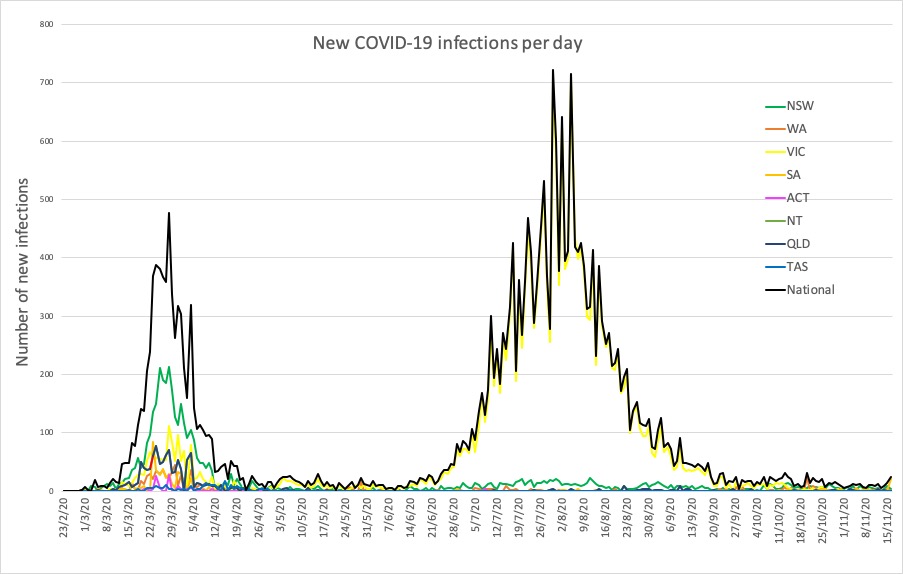Interim analysis of phase 3 study data suggests Moderna's COVID-19 vaccine has an efficacy of 94.5%.
Welcome to The Medical Republic’s COVID Catch-Up.
It’s the day’s COVID-19 news in one convenient post. Email bianca@biancanogrady.com with any tips, comments or feedback.
17 November
- Promising results from interim analysis of Moderna’s phase 3 COVID-19 vaccine trial.
- No increase in suicides in Queensland during pandemic, study finds.
- Case of likely intrauterine transmission of SARS-CoV-2 reported.
- Latest confirmed COVID-19 infection numbers from around Australia.
- Another day, another press release detailing encouraging COVID-19 vaccine results. This time Moderna has put out a release suggesting its SARS-CoV-2 vaccine has an efficacy of 94.5%.
The vaccine uses messenger RNA (mRNA), which inserts the genetic sequence that codes for a vaccine antigen into the host cell, so the person’s own cells generate the antigen rather than having it introduced externally as happens with conventional vaccines.
Moderna’s mRNA-1273 is in phase 3 trials involving more than 30,000 participants, who will receive two doses of the vaccine, and a primary endpoint of symptomatic COVID-19. The interim analysis is based on 95 cases of COVID-19, 90 of which were in the placebo group and 5 in the vaccine group, giving the efficacy of 94.5%.
The analysis of the secondary endpoint of severe COVID-19 showed all 11 severe cases were in the placebo group, and none were reported in the vaccinated group.
The press release said the study has not revealed any significant safety concerns beyond generally short-lived injection site pain, sore joints and muscles, headache and pain.
While Pfizer’s vaccine – also mRNA-based – requires storage at -80 degrees Celsius, Moderna’s formulation can be stored at -2 to -8 degrees C for up to 30 days, according to the Guardian. - Suicide rates have not increased in Queensland during the COVID-19 pandemic, according to a paper published in The Lancet Psychiatry.
Researchers analysed data from a state-wide real-time suicide surveillance system and found no significant differences in suicide rates before and after the pandemic began, even after adjusting for seasonality.
“Although these findings provide some short-term reassurance about the effect of lockdowns and stay-at-home orders, they do not give relief about long-term effects or information about other states or countries with more coronavirus cases and deaths,” the authors wrote. - A case of intrauterine transmission of COVID-19 resulting in fetal death has been reported in Emerging Infectious Diseases.
A 42-year-old woman at 27 weeks’ gestation presented to hospital in Parana, Brazil, with symptoms of COVID-19, tested positive for SARS-CoV-2, and soon required ventilation support as her condition worsened.
At day six after admission, fetal ultrasound found no movements or heart beat. The fetus was delivered by caesarean section. While the fetal tissues tested negative for SARS-CoV-2, viral RNA was detected in the umbilical cord and placenta. There was evidence of red serous effusions in the chest and abdomen, and petechial haemorrhages in the heart and lungs. The placenta also showed severe vascular malperfusion injuries, which the authors suggested could result from disruption to coagulation related to inflammation. - South Australia’s Parafields cluster has grown significantly, prompting fears the state is heading for a major outbreak. New lockdown restrictions have been announced from midnight Tuesday: gyms and recreation centres will close, all community sporting events are cancelled, private residence gatherings are limited to 10 people, and number restrictions will come into effect for hospitality venues, weddings, funerals and entertainment venues.
Schools will remain open but visitor restrictions will be introduced for aged care facilities.
Here are today’s confirmed COVID-19 infection numbers from around Australia to 9pm Monday:
National – 27,750, with 907 deaths
ACT – 114 (0)
NSW – 4498 (2)
NT – 46 (0)
QLD – 1185 (0)
SA – 544 (21)
TAS – 230 (0)
VIC – 20,345 (0)
WA – 788 (1)



